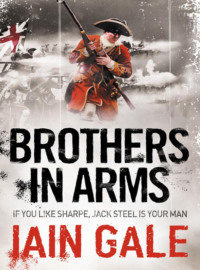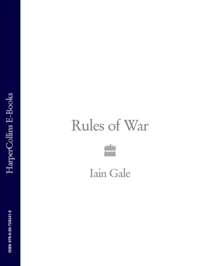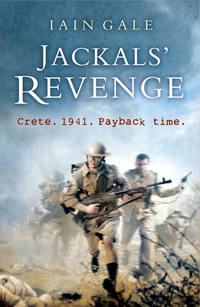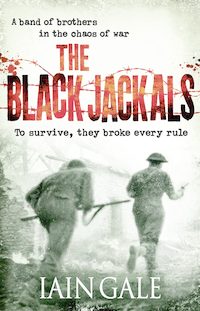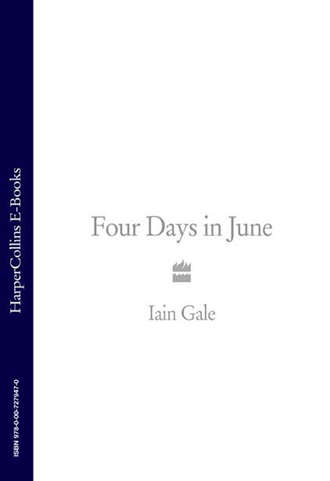
Полная версия
Four Days in June
She hugged him, smiling. ‘Is he really as awful a monster as they say, William? Have you seen him? Papa says that at Brienne he was really a very quiet little schoolboy. Very kind-natured. Clever. Good at snowball fights, he says.’
‘Your father, darling Magdalene, with respect, did not know the Bonaparte that we play with. The man is a tyrant. We presumed that we had rid the world of him. And now he has returned. He was not satisfied with an honourable peace. He still desires to have the world. To possess our world. Your world. He would reduce free-born Britons to slaves and put the world in chains to his own despotism. He proclaims his cause as freedom, but it is no freedom that I know: the freedom for which we fight. If you had seen, Magdalene, the things that I have seen. Terrible things. In Spain. Things done in his name. You would not talk of schoolboys and snowballs. He is a tyrant, Magdalene. A curse. An evil. And now we must silence him. Forever.’
‘I … shall not ask again, William.’ She let him go.
‘And I am sorry. I did not mean to become so passionate.’
‘You know, William,’ clinging once again to his tall, strong frame; stroking his back with her hand, pressing her leg against his own; touching the forelock of his thick, dark hair; running a finger down the length of his side-whisker, ‘it is never in my purpose to cool your passion.’ She looked him straight in the eyes. Smiled at her handsome soldier.
‘Magdalene. You quite disarm me.’
‘Oh no, William,’ letting go again, turning away, then back to look at him. Shamming coyness. ‘It is quite the contrary. You know, when we were first introduced I was quite intimidated by you. You had taken Edinburgh by storm. The talk of the town. So dashing. My … rambling soldier.’ She giggled.
‘Magdalene. Please. I am a soldier. I am an officer. I do command men.’
She smiled again. Through half-lowered lids. Played with the pale green silk bow of her low décolletage. ‘Well, then. Am I not also yours to command? Command me.’
Of course he had been late for dinner. Had arrived flushed, unsettled. The crumpled necktie told its story. D’Alava had not minded. He had known De Lancey for some years now. They had served together against the French in the fight for his homeland. Had ridden together with their friend Wellington. He knew too that he had only recently been married. And at a time when this day might be your last on earth, there were surely more important matters than social punctuality. Besides, he enjoyed the Englishman’s company. And De Lancey, in turn, relished the lack of formality of d’Alava’s house. Had become used to its like in Spain. Was his own man. Hated the pomp of the court and the garrison officers’ mess. Preferred the relaxed atmosphere of campaign life, where one night might bring an inn for a billet, another an open field. And this was as close as he could find to it. This, and the unexpected joy and daily novelty of his life with Magdalene.
‘But William, tell me.’ The genial, balding Spaniard flashed his dark, almost black eyes at his old friend, grinned and took another sip of the heavy red wine which he had brought here in no little quantity, from his own estates in Navarre, when appointed Spain’s Ambassador in Brussels. ‘You of all men have the Duke’s confidence … even above me. How does he intend to deal with Bonaparte?’
‘You know, Miguel, as I do, that my Lord Wellington is never quick to explain what he intends on the battlefield. Why, in the campaign of Salamanca, you will well recall, he did not vouchsafe any plan of execution, even to Sir George Murray. He is expert, Miguel, at keeping us all in the dark with regard to his intentions. He will sit at table with the General Staff and fill their heads full of humbug as to their dispositions. And then, not twelve hours later, will instruct me to issue an order which will march the brigades in quite the opposite direction. What we do know is that when Bonaparte moves on to the offensive – as move he will – we, the British and our Dutch and Belgian allies, are his most likely target. We are merely waiting for him to play his hand. You know that when the Peer met with Prince Blü cher last month it was agreed that the two armies should support each other and that the crucial axis of communication was to be the road from the Prussian army – at Sombreffe – to ourselves, around Nivelles.’
‘Yes. Of course, William. I am well aware of all this. But what will he do, d’you suppose? The “monster”, as all your pretty ladies here in Brussels like to call him. Wellington is obsessed, is he not, with the idea that Bonaparte intends to turn his right flank – to cut his communications and his escape route to the sea, at Antwerp? But what, William, if he is wrong? I think that your line is too extended. Let us say that he is wrong. That Blücher is the first to be attacked. Think of it. How will you ever move fast enough to help the Prussians? I do not think it can be done. And so…’ He made a forward gesture with his hands, as if pushing between two objects. ‘ … You are split in two by the French. And then …’ He clicked his fingers. ‘ … One …’ And again. ‘ … Two. I think that what we have here, my dear friend, is a simple conflict of interest. And I am wondering whether your good friends the Prussians – Prince Blücher and Count von Gneisenau – will share my opinion?’
‘Wellington will honour his word, Miguel. You know that. He will march to Blücher’s aid.’
‘But with what, William? With what? This army of twenty nations? If anyone is aware of the fine fighting quality of the British it is I. You and I, we remember Badajoz, Salamanca, Vitoria. But this army? Wellington himself has called it “infamous”. For every British soldier you have I hear that there are two Germans, Dutch or Belgians. Half of your army is German. Fine men of course, the King’s German Legion. They fought well in Spain. But William, what of the other Hanoverians? The militia? Peasants, farmers. And one third of your men are Netherlanders – most of whom, you will not deny, wearing the same uniforms with different hats and under different colours, were only a year ago fighting loyally for Bonaparte!’ He slammed his fist hard down on the table.
De Lancey leaned forward in his chair. ‘I cannot deny what you say, Miguel. But let me apprise you of some other facts of which you may be unaware. At this moment we have 95,000 men in the field; the Prussians no less than 130,000. We have more cannon than in any previous campaign and no want of ammunition. Do you know that the Peer has been in command of his “infamous” army a good two months and that during that time he has been careful to reorganize? Do you know that in every division, save the Guards, the Duke has taken care to mix the British battalions with veteran redcoats of the German Legion? Do you know that even in the Guards’ division he has specifically commanded that the three younger battalions should be stiffened with one of old sweats from the Peninsula? Do you know that in every brigade which contains inexperienced British troops, fresh from the shires, he has placed proven battalions of German regulars? And do you know that he intends to keep any doubtful elements of Belgians and Dutch well in the rear? No, Miguel. This army is not quite the flummery you might suppose it to be.’ De Lancey sat back. Smiled. Sipped his wine.
‘William. Dear friend. Do not agitate yourself. Be sure that I have great faith in Wellington. But what I am concerned with is how he will use his force.’
‘That all depends upon Bonaparte. And we shall soon enough know that man’s intentions. You may know that for over a month now our friend Colonel Grant has been busy behind French lines gathering intelligence, just as he did so well in Spain. We know that Bonaparte has assembled a sizeable army – around 200,000 men. And that perhaps 125,000 of them are directly before us on the border. What we do not yet know is quite where they will attack. It might be at Mons. Or at Tournai. Or at Charleroi. Once we do know that, then will be our time to act.’
‘But Wellington, you know well, William, prefers to defend. That is his skill. And here is the problem, my friend. Prince Blücher – Marshal “Vorwärts” – likes to attack. It is all very fine for Wellington to draw his supplies from the coast. But Blücher must pay to supply his army. Can you imagine what it is costing him now, just to sit on his arse?’
De Lancey, for once, was silent. Knew of old that this was mere teasing. That both men believed that their mutual friend, their commander, the hero of Spain, the toast of Europe, would be victorious. They were simply playing the same games that they had before every battle in Spain. Nevertheless the conversation had stirred some genuine worries, and it disturbed De Lancey to realize that he was concerned. He stared thoughtfully at his plate, took another sip of wine and, having considered his words, smiled before opening his mouth to reply.
As he prepared to do so, the double doors of the dining room opened and d’Alava’s butler came quickly to the table and cupped his mouth to his master’s ear. D’Alava spoke. ‘It seems that you have a messenger, De Lancey.’ He grinned. ‘He has come … from your wife.’
Spotless and gleaming, a young pink-cheeked British aide-de-camp was shown in, sword clattering, spurs ringing on the polished wooden floor. He handed De Lancey a note. D’Alava laughed and thumped the table with his fist.
‘So, my dear William. You see? You are away for only one hour and already your lovely wife has need of you. Ah, my friend. What it is to be young and in love.’
De Lancey unfolded the piece of parchment. Read it quickly. Rose to his feet. Turned to the aide: ‘Wait.’ Then to d’Alava. ‘You are sadly mistaken, sen˜ or. I assure you, this is no message from my wife, but an urgent dispatch for the Duke of Wellington. I am afraid, my dear Miguel, that here is an end to our delightful dinner.’
‘Can you tell me?’
‘It is from Berkeley, our man at the Prince of Orange’s headquarters, at Braine-le-Comte. It seems that at noon today the Prince’s office received information from General Dö rnberg that Bonaparte had crossed the frontier. But the Prince was not there to receive it. He was here, in Brussels, making a report of “light gunfire” to be heard in the direction of Thuin. And, as a consequence, no one thought to take any action on Dörnberg’s message – for over two hours. That is, until Berkeley happened upon it. Miguel, we have lost two hours. Bonaparte is at Charleroi.’
‘God help us.’
‘I must go to Wellington. Adieu, Miguel. Thank you again for your hospitality. Until we meet again.’
‘On the field of battle, William.’
Their handshake – wonderfully un-British, thought De Lancey – had become for both more than a gesture of farewell. It was a symbol of faith in their mutual survival. Just as it had been before Salamanca, Badajoz, Vitoria.
De Lancey turned and walked quickly to the door, closely followed by the aide, and out into the candlelit hall, where the clatter of the young man’s spurs changed to a brighter note as they rasped on the black and white marble of the chequerboard floor. At the door De Lancey turned again and raised his hand in a final farewell.
‘Till the battle, Miguel. Then we shall know the true mettle of this army. And so shall Bonaparte.’
Smiling, he turned through the door and walked out into the warm evening. Outside, at the foot of the steps, the aide was waiting, holding his horse by the pommel of its saddle. Without a word, De Lancey, who had arrived by carriage, took the reins and hoisted himself up. Sensing that this was hardly a time to protest, the aide let go his mount and, saying nothing likewise, De Lancey urged the handy little chestnut off along the street, quickly breaking into a canter. His speed alarmed several of the promenading couples, sending them back against the shuttered windows.
It was not far to the house that Wellington had taken – an imposing ten-bay mansion, set back from the Rue Royale, to the west of the Parc. De Lancey pulled up the horse, leapt from the saddle, leaving it untethered, and rushed past the redcoated sentries, through heavy oak doors, across the courtyard and into the house.
He found the Duke still seated at the dinner table, on which, although the dishes had been removed, there yet remained eight wine glasses and a half-full decanter of port. Everywhere – across the table, the chairs, the floor – lay papers. Maps, plans, orders of battle, reports. Wellington did not look up, continued to read.
‘General d’Alava was well?’
‘Quite well, sir. He sends his warmest regards.’
‘Oblige me, De Lancey. That piece of paper. There. Yes, that one. A despatch from General von Ziethen. Read it, please.’
‘Sir, I myself have come with a despatch.’
‘Quite so. Quite so.’ Wellington looked up. ‘And I presume I am correct in supposing that it will tell me that Bonaparte has attacked the Prussians … at Charleroi?’
‘Yes sir. But how … ?’
‘Read Ziethen’s despatch. Go on.’
De Lancey picked up the folded piece of parchment, and opened it. It was brief. A pointed cry for aid. The Prussians had indeed been attacked, at Thuin. Which would indicate that the initial French objective was Charleroi.
‘It is as we thought, your Grace. The secondary French plan. Bonaparte intends to push between us and the Prussians. To destroy first their army and then our own. In detail.’
It was just as d’Alava had predicted. Driving a wedge between the two armies, snuffing out first one, then the other.
‘Sir, we must act. What do you intend? We should surely alert the First Division. Call the reserve to arms. What are your orders, sir?’
‘My orders, Sir William, will be made plain by and by. It is not my intention, however, to amuse Bonaparte’s many spies and other fine friends in this city by running around Brussels like some dumb-struck virgin on her wedding night. Besides, I believe it may be a feint.’
In the wall directly behind Wellington a door opened in the panelling and six men entered. Staff officers. A gracious welter of red, blue and gold. Fitzroy Somerset, the Duke’s secretary; Sir Alexander Gordon, his principal aide-de-camp; George Lennox and George Cathcart, more aides; from De Lancey’s own office, Alexander Abercromby of the Guards; and George Scovell. Wellington addressed them, without turning his head from his papers.
‘Ah, gentlemen. To work. There is much to do.’
Half an hour later De Lancey, still riding the aide’s horse, pulled up outside his own house. Inside he found his staff – a dozen young men, junior officers mostly – all crowded around his young wife. They were by turns garrulous, detached, flirtatious, earnest. These were his chosen ones, the men who would carry the war and word of how to wage it to every brigade, every battalion. Will Cameron, young Ed Fitzgerald, Charles Beckwith in his distinctive rifleman’s green, James Shaw, the hero of Cuidad Rodrigo. Seeing him enter, their laughter stopped.
‘All right, gentlemen, as you were. The world is not yet come to an end. Magdalene, my dear, I am sure that you will forgive us if we make our headquarters in the dining room. Charles, ensure if you please that any messengers know to wait in the drawing room. Magdalene, my sweet, we shall need some sustenance. Perhaps cook would prepare us a little supper and a sufficient quantity of green tea. I suspect that we shall be on this business the entire evening.’
He sensed disquiet. Smiled.
‘No, no, gentlemen. Do not be alarmed. Rest assured that you will – all of you – be able to spend some time at the Duchess’s dance. Indeed the Commander-in-Chief himself has commanded it. All will go ahead as planned. William, be a good fellow and go and seek out Mr Jackson. More than likely you will find him walking alone in the park.’
His comment about the contemplative Jackson served to lighten the mood in the room.
‘And Edward, take yourself off and see if you can run to earth one Colonel Meyer, of the 3rd German Legion Hussars. His men are to be our couriers and escorts for the night.’
As the young men left to go about their errands, De Lancey began to feel the burden of his position. He realized that whatever should soon happen on the battlefield, this would most likely be for him a defining moment. It was his reponsibility to ensure that everything worked perfectly, otherwise disaster would ensue. It was he who would guarantee that every one of the troops of the allied army, some 95,000 men, would arrive at precisely the destination for which Wellington intended them, at precisely the correct moment. And that when they arrived they would be provided with the right equipment, and the right ammunition, in sufficient quantity.
Flashing him a nervous, sweet smile, Magdalene left to consult with the cook. De Lancey walked to the dining room, extracted from his soft leather valise the sheaf of order papers which Wellington had given him and laid them on the table before him. Other officers began to arrive now. William Gomm of the Coldstream, together with Hollis Bradford of the First Guards, both fresh from a shopping expedition, laden with bundles of lace; George Dawson of the Dragoons and Johnny Jessop of the 44th. And other, younger men, captains mostly – and now the lieutenants, Peter Barrailler and, at last, Basil Jackson, who had been discovered, as De Lancey had predicted, sitting in the Parc, reading Byron. Sixteen assistant quartermasters general; twelve deputy assistant quartermasters general. His military family.
Within minutes the room had become a scene of frenetic activity as the staff set about their business. Maps appeared from cylindrical carrying cases and were spread on the table to show the better of the roads and the capacity in tonnes of every bridge – and whether it was suited to taking artillery or cavalry. And around the long table the officers took up their stations, became in effect so many clerks, writing out in neat copperplate, in duplicate, every one of the Duke’s orders:
Dörnberg’s cavalry, to march upon Vilvorde;
Uxbridge’s cavalry, save the 2nd Hussars, to collect at Ninove;
The 1st Division to collect at Ath and be ready to move;
The 3rd Division to collect at Braine-le-Comte;
The 4th Division to collect at Grammont;
The 5th Division, the 81st Regiment and the Hanoverians of the 6th Division to be ready to leave Brussels momentarily;
The Duke of Brunswick’s Corps to collect on the road between Brussels and Vilvorde;
The Nassau troops to collect on the Louvrain road;
The Hanoverians of the 5th Division to collect at Hal and to march tomorrow towards Brussels;
The Prince of Orange to collect, at Nivelles, the 2nd and 3rd Divisions under Perponcher-Sidletsky and Baron Chassé;
The artillery to be ready to move off at daylight.
In effect the entire army was being placed in a state of readiness to move. But, as far as De Lancey could see, no unit had actually been ordered on to the offensive. Caution. Wellington was waiting. Would not move directly to help the Prussians. Did not believe that it might not be a feint. But what if d’Alava had been right? Equally, Wellington might be correct.
The French might intend to move against his right. But De Lancey also felt a sense of unease. He decided that the following morning, before the army moved off, he would send Magdalene away – to Antwerp, safe from the threat of what, to both he and the Spaniard, now seemed to be the obvious direction of French attack.
For over two hours the staff scribbled and copied, blotted, folded and sealed; sent the messages into the anteroom to the waiting Hussars and filed their duplicates at the end of the table. And all the time De Lancey pored over the maps; occasionally, noticing an anomaly, changed a route, recalled an order. And all the time Magdalene and the servants brought tea in pots and urns and whatever supper cook had been able to find for the officers – toasts and savouries, mostly. Not much was eaten, for no sooner would there be a slowing-down in the work than De Lancey, remembering something else, would call for a change of route, or issue an entirely new order.
It was past nine o’clock when they finished. And then, with hardly a moment’s pause, every one of the junior officers assembled at the end of the dining table, to be entrusted in turn by De Lancey with one of the duplicate orders. It was a practice which had proven its worth in Spain. How many times had a courier fallen from his horse, or been delayed by some unseen hazard? A second copy of every order was now to be delivered by ‘hand of officer’. And, like the originals, every one was to have its own receipt, from the hand of its recipient.
Check and double check. It was the only way, thought De Lancey. And he hoped to God that he had got it right. Had made no mistakes. That nothing would go wrong. For, whatever the virtue of Wellington’s strategy of caution, were anything to go awry in its execution, and if as a consequence of it the battle were to be lost, he knew that there was only one man in the entire army on whom the blame would fall.
THREE
Gosselies, 8.30 p.m. Ney
The evening, which he had hoped might offer a little relief from the heat of a long day, was proving oppressively warm, its intense humidity hinting at the possibility of a coming storm. Michel Ney, Duc d’Elchingen, Prince of the Moskowa, tall, barrel-chested, strikingly handsome in the gold-embroidered, dark blue coat of a Marshal of France, stood alone in the garden of a shell-damaged cottage on the edge of the town of Gosselies and looked to the north. Through his field telescope he scanned the sun-dappled fields of tall rye and wheat which stretched out towards Brussels and the waiting enemy. Behind him, tethered to an apple tree, grazing placidly, stood the horse he had bought two days ago from his old friend Marshal Mortier on his sick bed in Beaumont. Mortier, the veteran of Friedland, Spain, Russia, Leipzig, struck down now, at this time of greatest need, not by an enemy musketball but by an attack of sciatica. Well, they were none of them young any more.
An officer appeared at his side. A junior aide-de-camp. Chef de Bataillon Arman Rollin. Ney spoke.
‘I see nothing, Rollin. No one. You think?’
‘I can see no movement, sir.’ Ney dropped the spyglass from his eye.
‘No. Why should there be? Of course they’re not here. They’re further north. And to the east. Oh, we’ve found them all right, Rollin. But we have not yet brought them to battle. And that is what we must do, eh?’
But how? And with what? Ney was not yet sure exactly who it was that he commanded. Had not seen many of them. On paper he had a third of the army. In the field, he stood here at the head of a corps, II Corps, General Reille’s. But as to the rest of his command – he was beginning to wonder quite where it was. He thought of historical precedent for his predicament. Scanned his mind for the many military theorists of whom he had made a study – Frederick the Great, Caesar, Gustavus Adolphus, Turenne, Alexander. Could find little to help him. Perhaps Frederick’s invasion of Bohemia – a divided army, two wings. With what result? The battle of Lobositz. But had he kept his army intact Frederick could have marched on Prague and walked straight in. An opportunity lost. Ney prayed that they had not just made the same mistake with Brussels.
The marshal had staked everything on rejoining his Emperor. In truth it had not been hard to desert the Bourbons. His wife had been treated abominably by the ladies of the new Royalist court. His return to the eagles was inevitable. But there had been moments. In particular that embarrassing reconciliation in the Tuileries, with Napoleon making Ney pay for his previous defection and all his grand utterances in favour of the new monarchy. The agony of contrition. Particularly before his fellow generals. But then – silence. The Emperor had not rewarded him for his renewed loyalty until two days ago, when a letter had arrived at his château at Coudreaux, near Châteaudun, summoning him to the army. They had met at last at Avesnes. The Emperor had embraced him, had clapped his personal aide, Colonel Heymes, on the back. They had all joked and smiled. And over a long, relaxed dinner their friendship had resumed.


